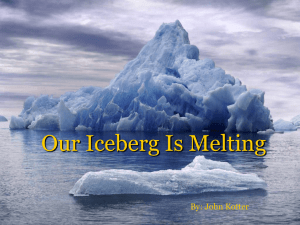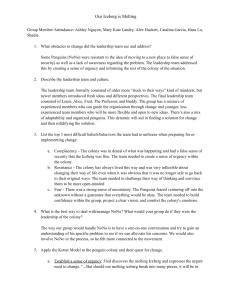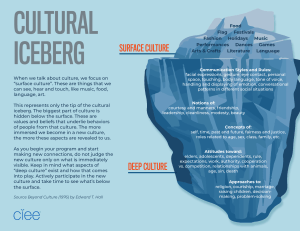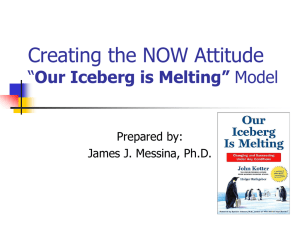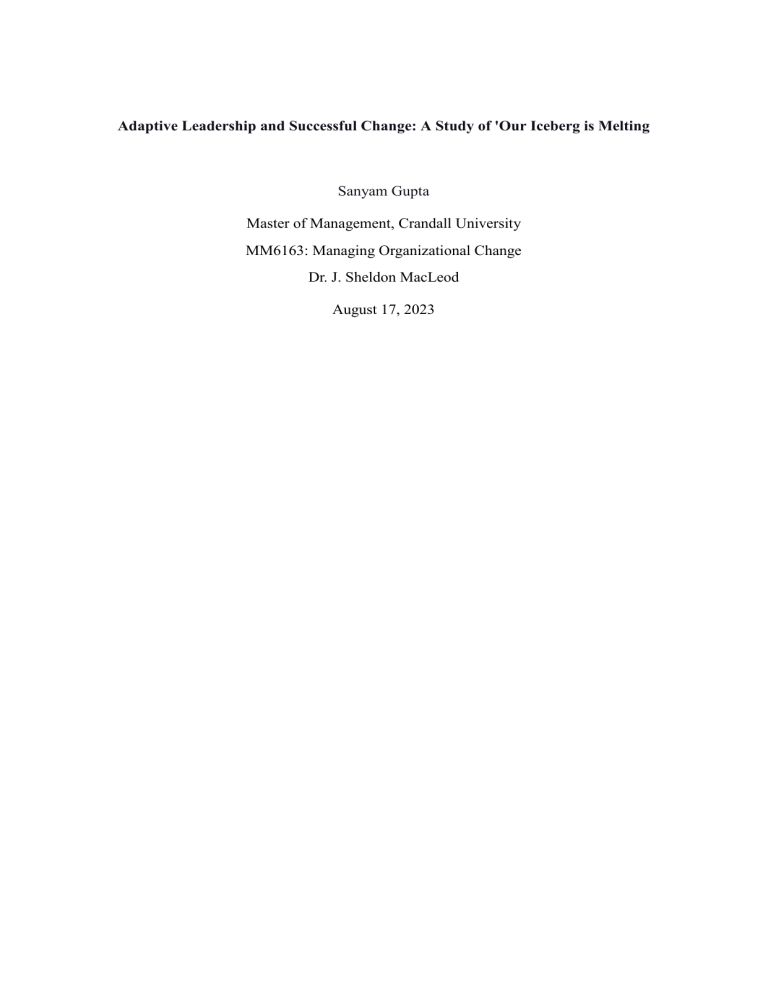
Adaptive Leadership and Successful Change: A Study of 'Our Iceberg is Melting Sanyam Gupta Master of Management, Crandall University MM6163: Managing Organizational Change Dr. J. Sheldon MacLeod August 17, 2023 Adaptive Leadership and Successful Change: A Study of 'Our Iceberg is Melting Introduction Organizations have a continuous need to adapt, develop, and evolve in today's dynamic business world. The capacity to effectively manage change is not only a necessary competency, but it is frequently a decisive element in an organization's long-term success. “Life is a dynamic process and no individual or organization can survive without passing through a series of changes.”(Bassey, et al., 2014). The challenges that organizations face, from advances in technology to variations in market demand, necessitate a disciplined approach to change management. This paper digs into the complexities of successfully managing organizational change, based on the popular book "Our Iceberg is Melting: Changing and Succeeding Under Any Conditions" by John Kotter and Holger Rathgeber. The journey of a colony of penguins facing the melting of their iceberg serves as a metaphor for the complexity of change management in this captivating narrative. As we delve into each step of the process, we explore how these principles resonate with established theories and academic research in the realm of change management. Each stage not only provides a practical framework for leading organizational transformation, but it also contains useful insights that can be applied to a variety of industries and situations. This paper aims to thoroughly examine the eight-step process outlined in "Our Iceberg is Melting," and to contextualize these phases within the larger landscape of change management literature. Each section will go into a single aspect of the process, relying on insights from the book while including scholarly resources to support the claims made. This paper attempts to provide a holistic perspective on effective change management by merging the book's narrative with scholarly research to get a deeper understanding of the principles that drive successful change projects. Journeying With Fred: A Penguin’s Tale of Change and Adaptation The engaging narrative "Our Iceberg is Melting" unfolds in the icy landscape of Antarctica, where a colony of penguins faces an unexpected challenge—a melting iceberg that threatens their habitat and way of life. The book, written by John Kotter and Holger Rathgeber, crafts an entertaining tale that acts as a source of inspiration as well as a practical guide to effective change management. The story revolves around Fred, a curious and foresighted penguin. Fred, recognized for his excellent observations and receptivity to new ideas, takes on the role of the protagonist, leading the colony on a transforming journey. His discovery of alarming cracks in the iceberg's walls sets off a chain of events that reveals their home's impermanence and the need to adapt to change. Fred's first attempts to warn his fellow penguins of the approaching danger are met with scepticism and resistance from the penguins who are connected to the comfort of their iceberg. Despite the opposition, Fred continues his goal to instil a feeling of urgency in the penguin colony. His determination drives him to bring together a varied group of penguins who share his concern and goal for change. This guiding alliance will be crucial in handling the upcoming challenges. As the penguin colony deals with the reality of their melting nest, Fred and his colleagues set out to find a new home. They face several challenges, overcoming setbacks and learning from their mistakes. The experiences of the penguins create a practical framework that connects theory and practice, making complex change management principles approachable and actionable. In the following sections, we will look at how each stage of the penguins' journey corresponds to known theories and provides practical guidance for efficiently managing change inside organizations. Analysis: Decoding the Principles of Successful Change Urgency as a Catalyst for Change Understanding that change is not just desired but also required is the foundation of any effective change endeavour. “With complacency high, transformations usually go nowhere because few people are even interested in working on the change problem” (Pollack, J., & Pollack, R.,2014). The first phase of the eight-step process, developing a sense of urgency, captures this important realization. In "Our Iceberg is Melting," Fred, a smart and observant penguin, discovers the unsettling fact that their cherished iceberg is melting. Fred's journey from realization to action parallels the process that organizations go through to instil a compelling sense of urgency in their members. The story of Fred's discovery and subsequent efforts to persuade his fellow penguins parallels real-world circumstances in which change makers must overcome scepticism and inertia. External variables such as market shifts, competitive pressures, or emerging innovations are frequently used by successful organizations to build urgency (Smith, 2005). These external drives operate as catalysts, driving stakeholders to recognize the need for change and developing a shared commitment to action. John Kotter's model is a cornerstone in the field of change management, providing a systematic way to manage organizational transformation. However, as Bucciarelli, L. (2015). correctly points out, there is a gap in Kotter's model—a gap that stems from the very beginning of change: the acknowledgment of the need for change. While Kotter's model is extensive and popular, it may inadvertently overlook this critical first stage. The book "Our Iceberg is Melting" alludes to the importance of recognizing change, but it does not go into detail about how to analyze the need for change. The book delves into the urgency of change and the development of coalitions, presuming that the need for change has been established. Guiding Coalitions for Collaborative Leadership Within the pages of "Our Iceberg is Melting," a penguin colony goes on an extraordinary journey that demonstrates the potential of collaborative leadership. Although set in the icy regions of Antarctica, this adventure has universal insights applicable to the dynamic world of organizational change. The concept of guiding coalitions, a cornerstone of effective leadership, emerges as a beacon of insight in both the story and the realm of change management theory. He emphasizes that such coalitions are not random conglomerates, but rather deliberate gatherings of persons with diverse knowledge and power. In the same way that the penguin coalition in the novel reflects distinct characteristics—Louis' analytical prowess, Buddy's determination, and NoNo's skepticism. Kotter emphasizes the significance of diversity in addressing complicated situations. Academic scholarship further bolsters the case for guiding coalitions. Researchers (Foster-Fishman et al., 2001) echo the potency of diverse collaborations. They posit that coalitions harness a synergy born from varied skills, fostering innovation and comprehensive problem-solving. Vision and Communication: Catalysts of Transformation The penguin community's journey in "Our Iceberg is Melting" powerfully displays the powerful importance of vision. Fred and his collaborative team, motivated by the desire to explore a new habitat, set the entire colony in motion. This shared vision serves as a beacon, instilling the penguins with a common goal and unbreakable resolve. This narrative resonance illustrates Kotter's belief in the binding power of a compelling vision, echoing the author's perspective on its unifying strength. According to (Millar et al., 2012), the vision of an effective leader serves as a guiding force, providing clarity and inspiration. This aligns with Kotter's assertion that a well-defined vision propels organizations beyond immediate obstacles, enabling them to navigate uncertainty with purpose. Communication and Commitment: Spreading the Change Message Effective communication is depicted in "Our Iceberg is Melting," when Fred and Alice recognized the severity of the melting iceberg, and collaboratively combined datadriven visualizations, emotional narrative, and open discourse to communicate the urgent threat to the penguin colony. They successfully capture their peers' attention, convey the gravity of the situation, and foster a shared commitment to take collective action by combining these strategies, demonstrating how skilled communication can bridge understanding, elicit emotional resonance, and catalyze concerted efforts toward addressing critical challenges. Academic research emphasizes the importance of effective communication in developing commitment. (Husain, 2013) highlights that honest communication from leadership develops a sense of commitment among employees. This is aligned with the narrative's picture of dedicated penguins uniting behind a common message of change. Empowerment in Action: Taking Ownership of Change The story shows empowerment in action as Fred and Alice spread leadership roles and responsibilities among the penguins, enabling each member to contribute their unique abilities and ideas. This is especially apparent when Fred and Alice create an environment in which other penguins step up to lead initiatives, make decisions, and actively engage in the transformation process. They demonstrate the transformative impact of empowerment by entrusting others with leadership tasks, allowing individuals to realize their potential, collaborate effectively, and collectively navigate the challenges of change, reinforcing the importance of shared ownership and engagement. (Whiteside et al., 2006) emphasizes that empowered people have higher levels of motivation, commitment, and adaptability. This corresponds to the narrative's picture of empowered penguins embracing change with determination. Generating Wins: Fostering Momentum and Celebration The penguin colony's story shows the transformational power of winning. The alliance, led by Fred, deliberately planned and celebrates little triumphs, creating penguin solidarity and motivation. This echoes Kotter's claim that these victories are strong tools for reinforcing the group's commitment to change. (Sharp, 2002) elucidate how even minor accomplishments significantly impact motivation and dedication. This is consistent with the narrative's depiction of penguins enjoying victories that drive their passion and participation. The research of John Kotter emphasizes the strategic importance of producing wins along the transition journey. According to Kotter, celebrating modest victories fosters the sense that change is possible and worthwhile. These victories generate positive feedback loops, which enhance morale and encourage continued effort. Consolidating Gains and Propelling Further Change While Fred and his alliance are celebrating their early triumphs, they are not resting on their laurels. Instead, they use the positive energy generated by these victories to tackle new issues and drive greater change. This aligns with Kotter's claim that maintaining momentum through consecutive change projects promotes an agile and flexible organizational culture. Early accomplishments, according to scholars, have a catalytic effect on subsequent transformative efforts. (Loeser et al., 2007) emphasizes how early successes feed a cycle of confidence and commitment. Their findings are consistent with the narrative's description of the penguins using their accomplishments to drive more change. Embedding Change in Culture As the coalition's efforts yield success, the penguins' culture undergoes tremendous change. What was previously perceived as a difficulty becomes a catalyst for transformation. Change is no longer just a reaction to circumstances; it is sewn into the fabric of their collective identity. This narrative arc echoes Kotter's thesis that change, when seamlessly incorporated into culture, lasts beyond discrete projects, producing an environment that is not just flexible but anticipates the need for change. (Braithwaite, 2006) discusses how culture molds employee behavior and attitudes and highlights that cultural change is more than just changing behavior; it is also about influencing an organization's common thinking. Similarly, the penguin colony's transition demonstrates how their cultural shift is about internalizing change as an essential element of their ethos, not just responding to external conditions. Conclusion The journey through "Our Iceberg is Melting" shows a changing tapestry in which the Antarctic landscape symbolizes the challenges and successes of organizational transformation. The narrative, which is based on John Kotter's change management concepts, resonates profoundly as a fable for navigating the uncharted waters of transformation within any organization. The path of the penguin colony follows Kotter's eight-step method, from building a feeling of urgency to embedding change in culture. Fred and his coalition's experiences show the principles that govern effective transformation as they help his fellow penguins through the tempest of change. The echoes of the narrative reverberate through Kotter's findings, providing validity to the universal applicability of these principles. The academic scaffold strengthens the pillars of change management by linking theory and narrative. Academic resources add empirical weight to the penguin colony's adventures, emphasizing the critical function of each principle in driving change, from establishing the importance of communication to highlighting the catalytic power of vision. In the area of organizational transformation, success is evaluated not just in individual successes, but also in the development of a culture that views change as an ongoing journey (Stouten et al., 2018). "Our Iceberg is Melting" concludes with a harmonious synthesis of tale and principle, affirming that by weaving Kotter's framework into an organization's fabric, it becomes equipped to navigate the unexpected tides of change. As we navigate our way through the pages of "Our Iceberg is Melting," we emerge not only with a profound appreciation for the penguins' tenacity but also armed with a toolkit of change management principles that transcend the bounds of fiction. The story's universal themes remind us that change is a constant, a vital force to be embraced rather than feared. Overall, with its rich narrative and insights, "Our Iceberg is Melting" acts as a beacon, guiding us through the intricacies of change. The voyage of Fred and his coalition, which parallels Kotter's ideas, demonstrates that successful transformation is more than just a journey—it's an expedition that molds cultures, empowers individuals, and charts a course toward long-term success in the face of adversity. References Bassey, A. O., Solomon, E. H., & Omono, C. E. (2014). An analysis of the application of change management in organizations. Academic Research International, 5(4), 481486. Braithwaite, J. (2006). Analyzing structural and cultural change in acute settings using a Giddens–Weick paradigmatic approach. Health Care Analysis, 14, 91-102. Bucciarelli, L. (2015). A review of innovation and change management: stage model and power influences. Universal Journal of Management, 3(1), 36-42. Foster-Fishman, P. G., Berkowitz, S. L., Lounsbury, D. W., Jacobson, S., & Allen, N. A. (2001). Building Collaborative Capacity in Community Coalitions: A Review and Integrative Framework. American Journal of Community Psychology, 29(2), 241– 261. doi:10.1023/a:1010378613583 Husain, Z. (2013). Effective communication brings successful organizational change. The Business & Management Review, 3(2), 43. Loeser, H., O’Sullivan, P., & Irby, D. M. (2007). Leadership lessons from curricular change at the University of California, San Francisco, School of Medicine. Academic Medicine, 82(4), 324-330. Millar, C., Hind, P., & Magala, S. (2012). Sustainability and the need for change: organizational change and transformational vision. Journal of Organizational Change Management, 25(4), 489–500. doi:10.1108/09534811211239272 Pollack, J., & Pollack, R. (2014). Using Kotter’s Eight Stage Process to Manage an Organisational Change Program: Presentation and Practice. Systemic Practice and Action Research, 28(1), 51–66. doi:10.1007/s11213-014-9317-0 Sharp, L. (2002). Green campuses: the road from little victories to systemic transformation. International Journal of Sustainability in Higher Education, 3(2), 128-145. Smith, I. (2005). Achieving readiness for organizational change. Library Management, 26(6/7), 408–412. doi:10.1108/01435120510623764 Stouten, J., Rousseau, D. M., & De Cremer, D. (2018). Successful organizational change: Integrating the management practice and scholarly literature. Academy of Management Annals, 12(2), 752-788. Whiteside, M., Tsey, K., McCalman, J., Cadet-James, Y., & Wilson, A. (2006). Empowerment as a Framework for Indigenous Workforce Development and Organisational Change. Australian Social Work, 59(4), 422–434. doi:10.1080/03124070600985996
